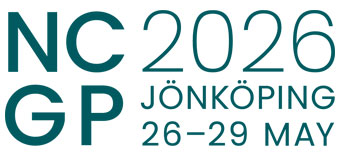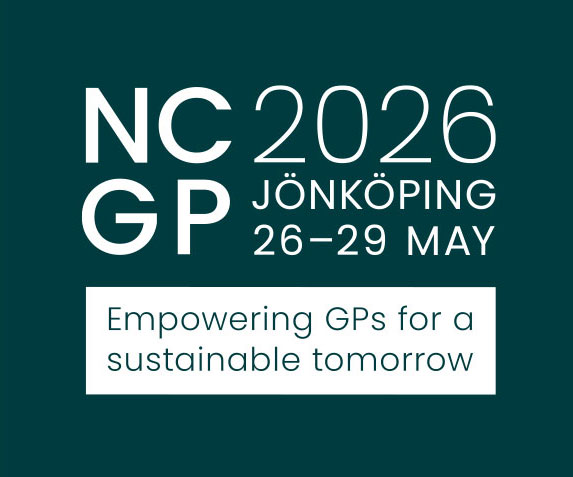CALL FOR ABSTRACTS
Dear Colleagues,
We are pleased to announce that the call for abstracts for the Nordic Congress in General Practice 2026 is now open. The abstract submission deadline is 4 December 2025. The conference will be held on 26–29 May 2026 in Jönköping, Sweden.
Begin by creating your profile, then you can submit your abstract. Please note that the abstract must be written in English.
Do not hesitate to contact us if you have any questions at ncgp2026@meetx.se.
We look forward to welcoming you to Jönköping in May 2026!
Best wishes,
On behalf of the Organizing Committee for the Nordic Congress in General Practice 2026
Instructions
TITLE: Spell out words, do not use abbreviations.Maximum of 120 characters.
AUTHORS: Names and surnames for each author must be provided. Do not include degrees or titles. Presenting authors’ name (chair if symposium) will be published in bold.
AFFILIATIONS: Each author should be listed by University/Hospital, Department and Country. Please make sure to include this complete information in the Affiliation text box.
TEXT: The abstract must be in English and should be a maximum of 250 words, excluding the title.
FIGURE/TABLE: You can submit ONE figure/table/image per abstract. If you have more than one figure/table please combine these into one image before uploading. Please use the separate field below the text to choose and upload the image. The image must be JPEG or PNG.
TOPIC: Please select one to three topics (maximum of 3).
The number of abstracts you can submit is a maximum of 2 abstracts per presenting author.
Authors are responsible for ensuring their abstracts are accurate and error-free. Any mistakes in spelling, grammar, or scientific content will be published as submitted if the abstract is accepted. Poor English may lead to rejection.
STRUCTURE FOR SUBMISSION FIELDS
Individual Abstract Submission
Each individual abstract should be structured using the following headings:
- Introduction: Provide background information and context for the study or topic.
- Aim: Clearly state the main objective or research question.
- Methods: Briefly describe the study design, participants, procedures, and analysis methods used.
- Results: Summarize the key findings. Quantitative and/or qualitative results should be included if available.
- Conclusions and Clinical Implication: Highlight the significance of the findings and their relevance to clinical practice or future research.
Workshop Submission
Please structure your workshop proposal using the following sections:
- Introduction: Outline the topic and context for the workshop.
- Aim: Define the objectives and what participants can expect to learn or achieve.
- Type of Interactivity with Participants: Describe the format of interaction (e.g., group activities, case discussions, role-playing, hands-on practice) and how participants will be actively involved.
Symposium Submission
When submitting a symposium, please include the following components:
- Introduction to the Symposium: Describe the overarching theme and the relevance of the topic.
- Aim of the Symposium: Explain the purpose and intended outcomes of the symposium.
- Titles of Presentations Included in the Symposium: List the titles of all individual presentations that will be part of the symposium (typically 3–5 presentations), along with the names of presenters (if available).
Call for abstract: 1/9 /25
Submission deadline: 4/12/25
Assessment period: 19/12/25 –26/1/26
Decision communicated by: 12/2/26
Proposed Abstract Categories for NCGP 2026
View the categories & descriptions below:
Clinical General Practice
Description:
– Multimorbidity and complex care needs
– Care for children and adolescents
– Continuity of care
– Patient centered care
– Mental health
– Cancer
– Cardiovascular
– Respiratory
– Obesity and type 2-diabetes
– Infections
– Musculoskeletal
– Women’s health
– End-of-life care
– Other
Environmental Health and Sustainability
Description:
– Climate change and health impacts
– Ecological impact of health care
– Sustainable healthcare practices
– Choosing Wisely
– Guidelines in general practice
– Overdiagnosis and overtreatment
– Other
Digitalization and Technology
Description:
– Artificial intelligence and decision support
– E-health and telemedicine
– Digital tools for patient self-care
– Ethical and practical challenges of digitalization
– Other
Continuous Professional Development (CPD)
Description:
– Undergraduate and postgraduate medical education
– Vocational training and supervision
– Lifelong learning and CPD strategies
– Communication and consultation skills
– Other
Prevention
Description:
– Preventive programs
– Screening programs and risk communication
– Other
Health Equity
Description:
– Access to care and service delivery
– Migrant and refugee health
– Social and structural determinants of health
– Other
Health services
– Leadership and organizational development
– Interprofessional collaboration and team-based care
– Policy, governance, and healthcare reform
– Innovation in primary care systems
– Task shifting
– Quality and safety
– Other

